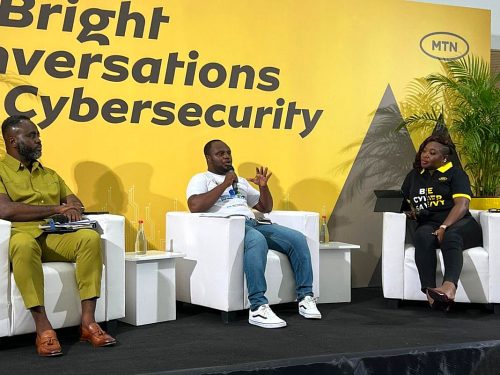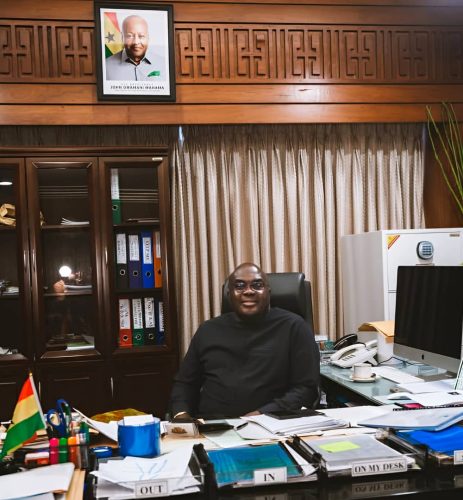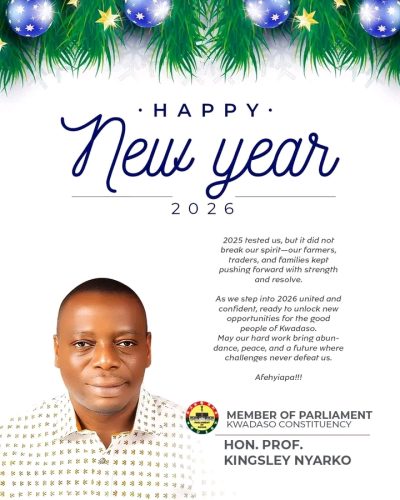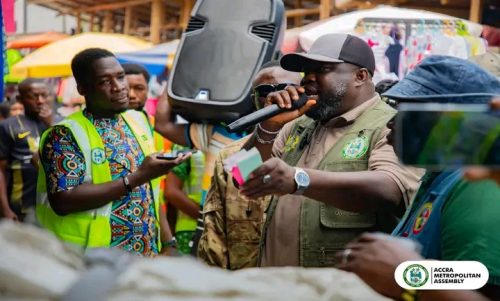

By Enock Akonnor (Managing Editor) enockakonnor2013@gmail.com

As Ghana deepens its digital transformation, experts are warning that the country’s greatest cybersecurity risk may not lie in technology but in the people using it.

At the latest Bright Conversations forum hosted by MTN Ghana, thought leaders and cybersecurity professionals called for a shift from technical fixes to cultivating a culture of digital responsibility and ethical technology use across society.

Moderated by Jacqueline Hanson-Kotei, Senior Manager for Enterprise Information Security and Governance at MTN Ghana, the session featured Isaac Socrates Mensah and Seth Gyapong-Oware, both from the Cyber Security Authority (CSA), who explored how social behavior, not just software, drives today’s cyber threats.
The Human Element: Ghana’s New Cybersecurity Challenge

Mr. Mensah revealed that most of Ghana’s cyber incidents in 2025 have stemmed from social manipulation rather than technical breaches.
“The biggest vulnerability in cybersecurity today is not the machine; it’s the human being,” he said. “Many attacks succeed because someone was tricked, deceived, or simply unaware.”
According to the CSA, nearly 300 cyber-related cases have been reported this year, involving scams, impersonations, and phishing schemes that exploit people’s trust.
Mr. Mensah emphasized that while systems and software remain important, the real battle is behavioral.
“Cybersecurity begins with awareness. Technology can protect you only if you use it wisely.”
Building a Responsible Digital Culture
The forum encouraged Ghanaians to adopt a mindset of shared responsibility in cyberspace, where every user plays a role in protecting data and maintaining trust.
“Cybersecurity is everyone’s job,” Mr. Mensah stressed. “Just like we lock our doors at home, we must learn to lock our digital lives.”
He also urged citizens to be cautious of misinformation, online extortion, and fraudulent investment platforms scams that are often disguised as legitimate opportunities.
Securing Identities and Devices
Highlighting ongoing reforms, Mr. Mensah disclosed that the Cyber Security Authority is collaborating with mobile network operators to link every registered SIM card to its corresponding device.
“Once a SIM linked to a device is found to be involved in fraud, that device will be blacklisted across all networks,” he explained. “We’re making it harder for criminals to operate and easier for victims to get justice.”
The upcoming SIM re-registration exercise, he added, will further strengthen digital identity systems and ensure accuracy in user verification.
Teaching Startups to Design with Safety in Mind
Mr. Mensah also appealed to entrepreneurs and small businesses to treat cybersecurity as a design principle rather than an afterthought.
“Don’t build first and protect later,” he advised. “Security should be part of your innovation process. The future belongs to companies that customers can trust.”
He encouraged startups to invest in staff training, regular audits, and a “security-first” culture to ensure long-term sustainability.
Protecting Children in a Digital World
In one of the most compelling parts of the discussion, the panel addressed the growing risk of child exposure to harmful content and online predators.
Mr. Mensah warned that using adult accounts to set up children’s devices removes built-in safety controls.
“It’s like handing your child the keys to a car without teaching them how to drive,” he said. “Parental supervision is no longer optional. It’s essential.”
He cited international cases where minors were manipulated by artificial intelligence and chatbots, urging parents to be vigilant and use child-friendly platforms like YouTube Kids and safe browsing settings.
A National Effort Built on Collaboration
CSA’s Seth Gyapong-Oware emphasized that effective cybersecurity depends on cooperation between government, private institutions, and individuals.
“Cybersecurity is not just about laws and firewalls. It’s about people, education, and behavior,” he said. “We need a culture where every Ghanaian treats online safety as a civic duty.”
He highlighted the government’s ongoing policy efforts under the National Cybersecurity Agenda, aimed at strengthening institutional collaboration, international partnerships, and public education.
MTN Ghana: Leading the Charge for Safer Connectivity
For MTN Ghana, cybersecurity awareness is an extension of its commitment to empowering communities through technology.
“At MTN, we see ourselves not just as a telecom provider, but as a partner in Ghana’s digital journey,” said Ms. Hanson-Kotei. “That journey must be safe, informed, and inclusive.”
Through its Bright Conversations series, MTN continues to engage the public on responsible technology use, ethical innovation, and online safety—especially among youth and small businesses.
“Digital safety is not just a technical issue. It’s a social responsibility,” the company affirmed. “Together, we can build a Ghana where connectivity empowers, not endangers.”
Source; www.leakyGhana.com

Enock Akonnor is an experienced Ghanaian journalist, based in Kumasi and currently serves as the CEO and Managing Editor of www.leakyghana.com.
With a wealth of expertise built over many years in the media industry, he has earned a solid reputation as one of Ghana’s most sought-after journalists.
Contact:
📞 +233 541 921 562
✉️ enockakonnor2013@gmail.com









